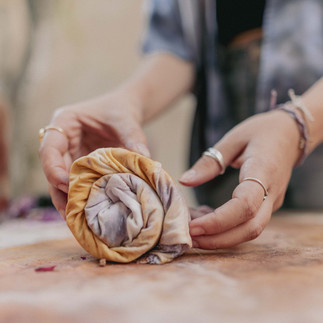Sustainable Fashion Journey: From Greece to Global Eco-Innovation- Christiana Vardakou
- ARTE.M Association
- May 21, 2024
- 3 min read
I grew up in Greece and always knew I wanted to go to Art School when I grew up.
When I was 18 I moved to London where I did a Foundation Course in Art and Design. I chose to continue my studies in Textile Design, and I got my degree in BA:Textile Design from UAL: Chelsea College of Art.

I chose textiles because I was interested in Art, Fashion and Interior Design and thought that by specialising in textiles I could do all three. During my degree I started experimenting with natural dyeing, and fell in love with the colours achieved by using plants to create botanical colours.
After my studies, I went to South East Asia for four months and travelled to 7 countries to learn more about traditional textile techniques such as natural dyeing, weaving, appliqué, embroidery, and others. Even though I was going to return to London to start a job working as a print designer for a textile studio...
I decided to say no and move back to Greece to start my own sustainable small business. In the beginning I was working primarily with architects and interior designers to create pillows, runners, curtains for villas around Greece.
Slowly I started having clients that were asking for clothing and accessories, and now we do a combination of all three (clothing, homeware and accessories).
Why do you consider your fashion art to be stainable?
My business is the first in Greece to use natural dyes to color 100% Greek cotton, linen, and silk. Transparency is the most crucial factor in brand sustainability for me.
I arranged my studio so customers could witness the completed works and the whole manufacturing process. When visitors visit us, they may view the un-dyed yarns, weaving process, natural dyeing kitchen, dried plants, and bundle dyeing, batik, shibori, and eco-printing processes. Pattern cutting, stitching, and hand-finishing are also seen.
So our customers know how long it takes to make something, who manufactured it, and the process from start to end, we share a lot on social media.
All of our things come with a little CV that covers the manufacturing process (where the cloth comes from, which plant we used for dying, who dyed it, what method was used, who stitched it). We provide upcycling and repairing services, allowing customers to give their organic clothes a second life via dyeing. Our zero-waste attitude allows us to reuse leftovers to produce patchwork purses, lavender sachets, and more.
Natural colors reduce resource usage, energy use, and pollution and emit no toxic chemicals. All of our products are biodegradable since natural dyes only work on organic fibers. Dye waste becomes compost for our studio garden. Natural coloring is safer for designers, textile workers, and customers. Unlike synthetic colors, they do not contain hazardous chemicals that might cause skin irritation or respiratory ailments.

How can you describe your client ?
Our clients value sustainability, they prioritise environmentally friendly practices and appreciate the use of natural dyes over synthetic alternatives.
They also value quality and craftsmanship, appreciating attention to detail that goes into hand-dyeing techniques and the creation of one of a kind pieces. They also seek clothing that reflects their unique style and personality, and who are drawn to the idea of owning clothing that are not massed produced. Our customers prefer classic, timeless designs that won't go out of style quickly, allowing them to wear and cherish their garments for years to come.
Do you work only in Greece ?
No, as a brand we ship worldwide, therefore our items are available for everyone through our website. However, we do not collaborate with any retail stores outside of Greece yet.
Your eco message ?
Fast fashion is a highly unsustainable and exploitative industry that prioritises profit over people and the planet.
Addressing its negative impacts requires systemic changes in consumer behaviour (start asking questions: who made my clothes? who made my fabric? what is this fabric made out of?
industry practices (designers and brand owners should start working with fabrics that are good for the environment, should take care of the workers, should value the whole chain) and government policies to promote ethical and sustainable alternatives. And most importantly we should all understand that quality is far more important than quantity!
What are your future plans ?
We are looking to expand in other countries, to host pop-ups in different countries where we will demonstrate some of our natural dyeing techniques, meet new people and potential customers while also maybe teaching some natural dyeing workshops in other countries. We are also really interested in new collaborations with other fashion brands (worldwide), we would like to collaborate by naturally dyeing fabric for them. Finally, I am hoping that our team will continue to grow.
























































Comments